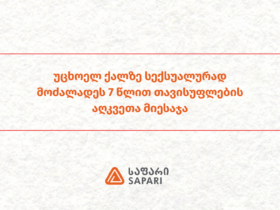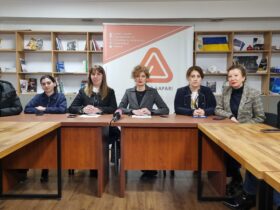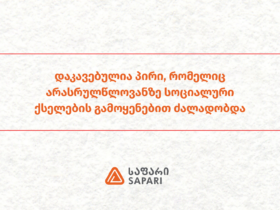On 8th of December 2017 Union Sapari presented research report – “Women’s Economic Empowerment in Georgia: Analysis of Existing Policies and Initiatives”. The report was published by the financial support of the Swedish Government and support of the United Nations Development Program (UNDP), within the framework of the UN Joint Program for Gender Equality.
The aim of this research was to contribute to the formation of the women’s economic empowerment policy in Georgia. In particular, it studied the work undertaken by the state, international and local non-governmental organizations in respect to women’s economic empowerment, as well as the attitude of corporate sector towards this issue. Research report analyzed: what was the main challenges in regards to women’s economic empowerment in Georgia; mostly what type of activities were implemented for women’s empowerment; and what were the international best practices for increasing women’s economic participation.
This is a qualitative research within the framework of which 31 in-depth interviews were conducted with the representatives of the state and international and local nongovernmental organizations as well as with the beneficiaries of the projects implemented. With respect to the corporate sector, the data was collected based on questionnaires and telephone interviews. In addition, we requested some quantitative data from the relevant agencies the descriptive analysis of which contributes to understanding of the complete picture.
The research shows that the main challenges for women’s economic empowerment are access to financial resources and support to women’s agency. There exists no policy on women’s economic empowerment in Georgia. Although proper institutional and legislative bases are in place, they are not effective. During the last ten years only the programs implemented by international and local non-governmental organizations have been working exclusively on women’s economic empowerment. There is a lack of awareness of gender equality, and consequently gender equality policies within the corporate sector.
Women in rural areas, as a twice-vulnerable group, require special attention. Unfortunately, there is no state policy in this direction today. Besides Enterprise in Georgia, none of the other state programs on economic empowerment considers the inclusion of rural women as a priority issue. There is no such criterion in any program of the Ministry of Agriculture itself. Women, in most cases, participate in programs developed for SMEs. Their participation is drastically reduced in large business activities. Women’s involvement in one of the least funded projects is the highest, while in the Preferential Agro-Credit Program with largest budget – 47 million GEL – women’s involvement is only 7.3%.
Union Sapari elaborated recommendations for the government of Georgia, international and local non-governmental organization as well as corporate sector, suggesting possible ways to solve all the issues and challenges they face in regards to women’s economic empowerment in Georgia.






